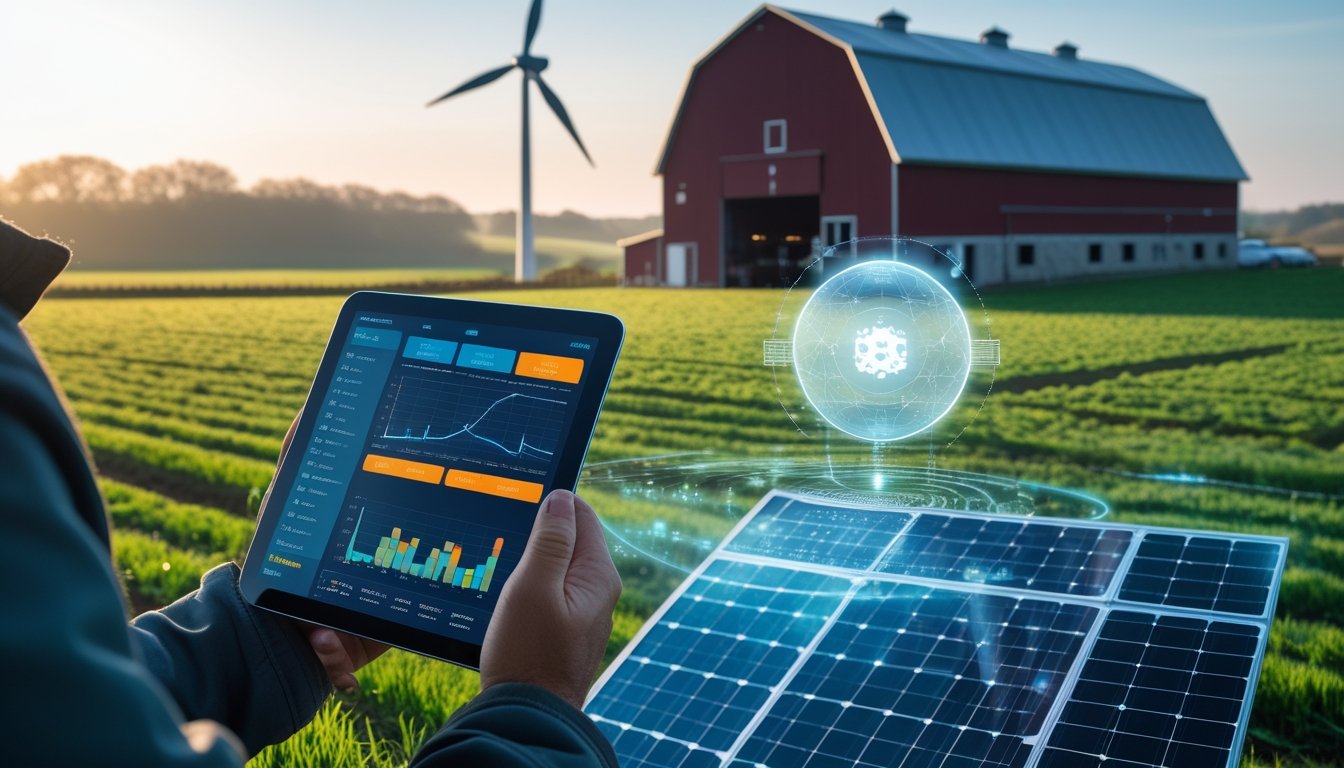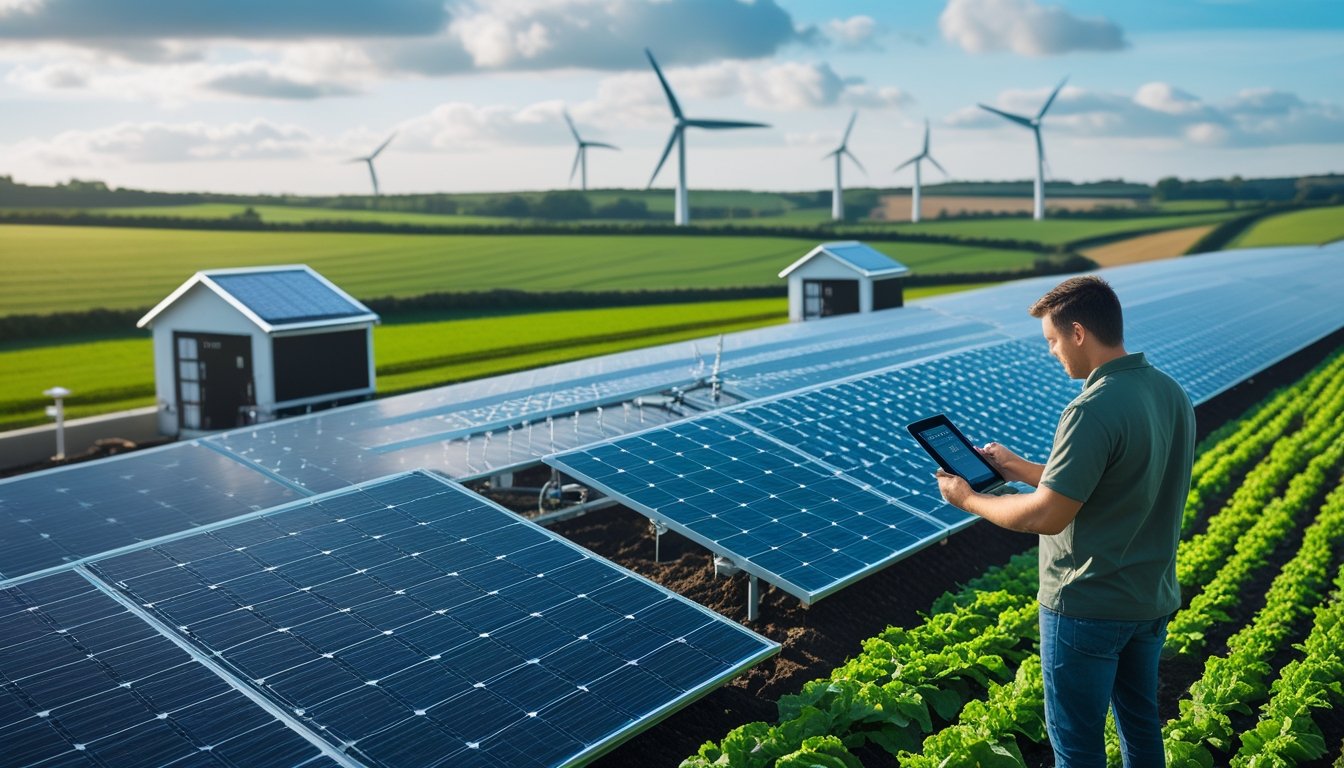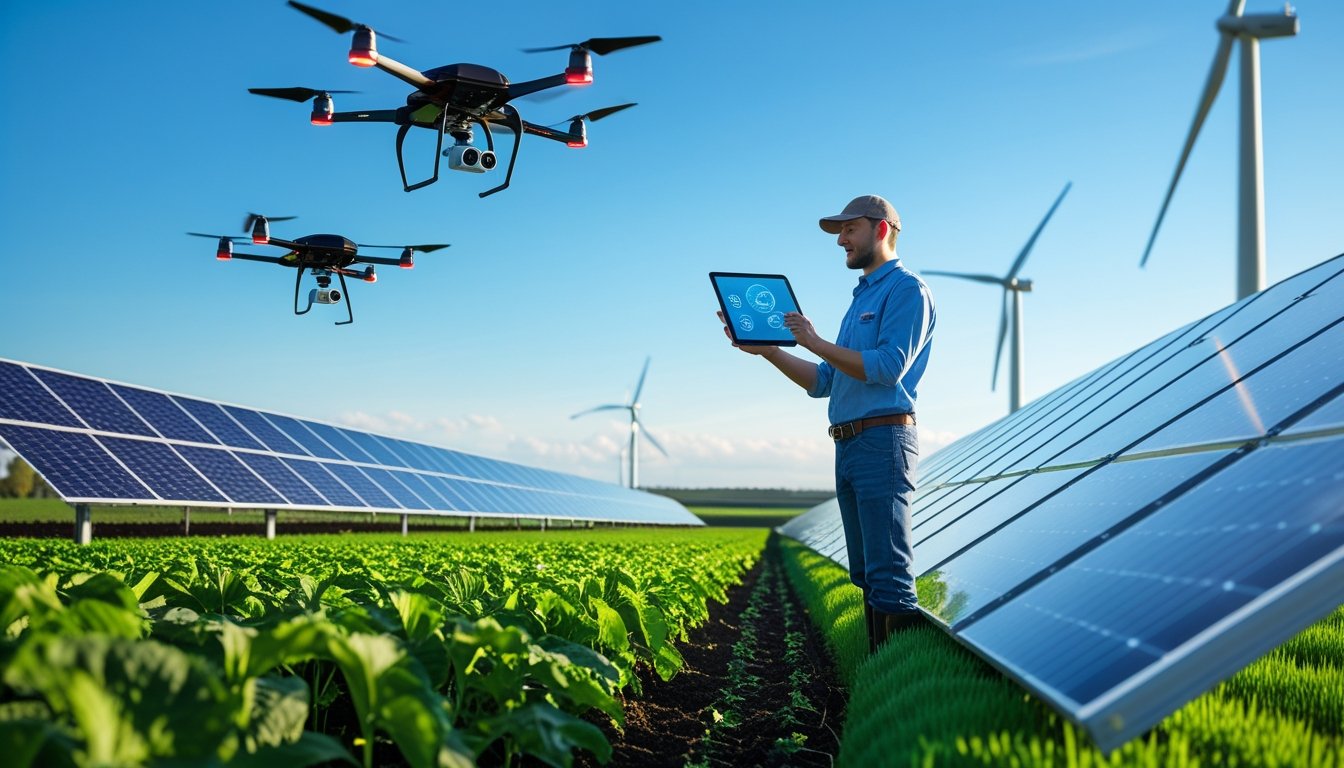Late updated: 16 Jun 2025 08:06
Written by: Oliver Bennett
AI Impact On UK Farm Energy Efficiency: Transforming Agricultural Practices
Artificial Intelligence is steadily reshaping the landscape of UK agriculture, particularly regarding energy efficiency. By integrating AI technologies into farming practices, we are witnessing a reduction in resource consumption and an improvement in productivity. AI-driven tools help manage energy use efficiently, reducing waste and ultimately contributing to more sustainable farming operations. This transformation promises not only financial savings but also significant environmental benefits.

Our exploration into these technologies reveals how AI enhances energy management across farms in the UK. Drones, sensors, and machine learning models work together to optimize operations, providing real-time data analysis for better decision-making. Farmers can manage their energy expenditures more effectively by strategically deploying technology, resulting in reduced carbon footprints while maintaining high productivity levels.
To truly appreciate the potential of AI in agriculture, it is essential to consider its implications for energy sustainability. By leveraging AI, UK farms are pioneering more resilient and resource-efficient practices that can serve as a model for global agricultural operations. Through continuous innovation, AI is driving the farm industry toward greener pastures.
Key Takeaways
- AI enhances energy efficiency on UK farms.
- Sustainable farming practices benefit from AI's real-time data analysis.
- UK farms leverage AI for resource-efficient agricultural operations.
How Artificial Intelligence Is Transforming UK Farm Energy Efficiency
Artificial intelligence is reshaping energy efficiency in UK agriculture by incorporating advanced technologies like machine learning to optimise resource usage and integrate renewable energy sources. This transformation leads to reduced energy consumption, cost savings, and sustainable farming practices.
The Role of AI Solutions in Modern Agriculture
AI solutions play a significant role in modern agriculture by providing precise data analytics and insights that significantly improve energy efficiency. Data from sensors and satellites are processed by AI algorithms to monitor energy use, predict demand, and identify areas where energy savings can be made. AI-driven systems can offer suggestions for optimising equipment performance, ensuring that only necessary energy is used. By minimising energy waste, we can enhance sustainability and cut costs.
Energy Management and Optimisation Through Machine Learning
Machine learning, a subset of AI, offers substantial advantages for energy management and optimisation on farms. By analysing historical data, machine learning models can forecast energy needs based on weather patterns, production schedules, and daily farm operations. These predictions enable us to fine-tune energy allocation, ensuring that resources are used efficiently without unnecessary consumption. Machine learning helps us maintain balance in energy use, allowing British agriculture to operate more sustainably while reducing operational costs.
Integrating Renewable Energy Sources with Farm Operations
Integrating renewable energy sources like solar and wind power into farm operations is vital for enhancing energy efficiency and reducing dependence on conventional energy sectors. AI-powered systems facilitate this integration by managing and optimising the use of renewable energy based on farm requirements and availability. By leveraging AI, we can anticipate energy production fluctuations and adjust consumption accordingly. This seamless integration not only supports environmental goals but also ensures the farm’s energy resilience, paving the way for a sustainable future in agriculture.
Environmental and Operational Impact of AI on UK Farming Practices

AI technologies are reshaping UK farming by significantly enhancing efficiency and reducing ecological impacts. Our focus on implementing AI tools has led to improved carbon management, meticulous resource monitoring, and a proactive transition to sustainable energy sources.
Reducing Carbon and Greenhouse Gas Emissions in Livestock and Dairy Farms
AI applications play a critical role in decreasing carbon and greenhouse gas emissions across UK livestock and dairy farms. By incorporating AI-driven data analytics, farms can monitor energy consumption patterns, allowing for precise interventions. AI systems enhance feed optimisation and animal health monitoring, cutting methane emissions from cattle.
Implementation of automated detection tools helps us identify and mitigate environmental stressors that may increase emissions. Using AI-powered machinery, such as precision manure management systems, further reduces methane production. Our commitment to these technologies supports sustainable agricultural practices and reduces the environmental impact of farming operations.
Energy Transition, Sustainability, and Net Zero Goals in British Agriculture
Striving for net zero goals, British agriculture is leveraging AI to facilitate the energy transition towards more sustainable practices. AI enables us to map and analyse energy usage patterns, driving improvements in energy efficiency across farms. Smart systems optimise the integration of renewable energy solutions, such as solar and wind, into our operations.
This transition supports environmental sustainability, aligning with national sustainability objectives. Our adoption of AI-enhanced technologies helps meet demanding sustainability targets while maintaining the profitability and productivity essential to the agricultural sector.
Optimised Resource Management and Real-Time Monitoring
Optimising resource management is crucial for sustainable farm operation. AI offers real-time monitoring, which maintains a seamless balance of resources such as water, fertiliser, and energy. Machine learning algorithms predict crop needs and support timely interventions, improving overall efficiency.
This real-time oversight allows us to promptly address potential resource shortages or surpluses, safeguarding food security. As we employ precision agriculture, resources are allocated when and where they are needed most. Incorporating AI-driven tools ensures that our farms operate at peak efficiency while reducing waste and environmental damage, ultimately contributing to a more sustainable agricultural framework.
Frequently Asked Questions

Artificial intelligence plays a pivotal role in enhancing energy efficiency in UK agriculture. Through cutting-edge technologies, it reduces energy consumption, optimises resource allocation, and helps maintain sustainable farming practices. The integration of AI into agriculture has created opportunities for cost savings and improved environmental impacts.
How does artificial intelligence contribute to energy conservation in UK agriculture?
AI technologies automate many farming tasks, leading to more efficient energy use. By monitoring and analysing data on crop needs, AI enables precise applications of water and fertilisers, cutting down unnecessary energy consumption.
What advancements have been made in AI that benefit farm energy management in the UK?
AI advancements such as predictive analytics and machine learning help farmers anticipate energy needs. The use of digital twins allows simulations of farming scenarios to determine the most energy-efficient processes before implementation.
In what ways has AI implementation improved energy efficiency on farms across the UK?
AI systems streamline operations by automating tasks like irrigation and pest control. This reduces the amount of energy used per unit of output. Sensors and data analysis ensure resources like electricity and fuel are used optimally, lowering overall consumption.
What are the potential long-term effects of AI on energy sustainability in UK farming?
In the long run, AI could drastically reduce carbon emissions from agriculture by increasing efficiency and minimising waste. It supports sustainable practices that align with the UK's environmental goals, contributing to a greener future for farming.
How do AI technologies optimise resource usage for enhanced energy efficiency in agriculture?
AI enables the collection and analysis of vast amounts of data, helping to allocate resources exactly where needed. This precision reduces waste and ensures that no excess energy is used, making operations more efficient and environmentally friendly.
Can AI significantly reduce energy costs in UK agricultural practices?
AI can substantially lower energy costs by improving operational efficiency. By predicting demand and reducing wasteful practices, farmers can cut down on energy expenses while maintaining or even boosting productivity.
